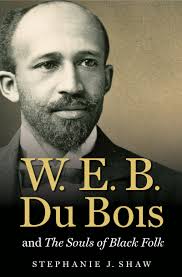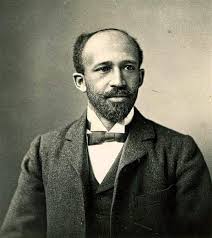The Souls of Black Folk Page #5
The Souls of Black Folk is a 1903 work of American literature by W. E. B. Du Bois. It is a seminal work in the history of sociology and a cornerstone of African-American literature. The book contains several essays on race, some of which the magazine Atlantic Monthly had previously published.
Three characteristic things one might have seen in Sherman’s raid through Georgia, which threw the new situation in shadowy relief: the Conqueror, the Conquered, and the Negro. Some see all significance in the grim front of the destroyer, and some in the bitter sufferers of the Lost Cause. But to me neither soldier nor fugitive speaks with so deep a meaning as that dark human cloud that clung like remorse on the rear of those swift columns, swelling at times to half their size, almost engulfing and choking them. In vain were they ordered back, in vain were bridges hewn from beneath their feet; on they trudged and writhed and surged, until they rolled into Savannah, a starved and naked horde of tens of thousands. There too came the characteristic military remedy: “The islands from Charleston south, the abandoned rice-fields along the rivers for thirty miles back from the sea, and the country bordering the St. John’s River, Florida, are reserved and set apart for the settlement of Negroes now made free by act of war.” So read the celebrated “Field-order Number Fifteen.” All these experiments, orders, and systems were bound to attract and perplex the government and the nation. Directly after the Emancipation Proclamation, Representative Eliot had introduced a bill creating a Bureau of Emancipation; but it was never reported. The following June a committee of inquiry, appointed by the Secretary of War, reported in favor of a temporary bureau for the “improvement, protection, and employment of refugee freedmen,” on much the same lines as were afterwards followed. Petitions came in to President Lincoln from distinguished citizens and organizations, strongly urging a comprehensive and unified plan of dealing with the freedmen, under a bureau which should be “charged with the study of plans and execution of measures for easily guiding, and in every way judiciously and humanely aiding, the passage of our emancipated and yet to be emancipated blacks from the old condition of forced labor to their new state of voluntary industry.” Some half-hearted steps were taken to accomplish this, in part, by putting the whole matter again in charge of the special Treasury agents. Laws of 1863 and 1864 directed them to take charge of and lease abandoned lands for periods not exceeding twelve months, and to “provide in such leases, or otherwise, for the employment and general welfare” of the freedmen. Most of the army officers greeted this as a welcome relief from perplexing “Negro affairs,” and Secretary Fessenden, July 29, 1864, issued an excellent system of regulations, which were afterward closely followed by General Howard. Under Treasury agents, large quantities of land were leased in the Mississippi Valley, and many Negroes were employed; but in August, 1864, the new regulations were suspended for reasons of “public policy,” and the army was again in control. Meanwhile Congress had turned its attention to the subject; and in March the House passed a bill by a majority of two establishing a Bureau for Freedmen in the War Department. Charles Sumner, who had charge of the bill in the Senate, argued that freedmen and abandoned lands ought to be under the same department, and reported a substitute for the House bill attaching the Bureau to the Treasury Department. This bill passed, but too late for action by the House. The debates wandered over the whole policy of the administration and the general question of slavery, without touching very closely the specific merits of the measure in hand. Then the national election took place; and the administration, with a vote of renewed confidence from the country, addressed itself to the matter more seriously. A conference between the two branches of Congress agreed upon a carefully drawn measure which contained the chief provisions of Sumner’s bill, but made the proposed organization a department independent of both the War and the Treasury officials. The bill was conservative, giving the new department “general superintendence of all freedmen.” Its purpose was to “establish regulations” for them, protect them, lease them lands, adjust their wages, and appear in civil and military courts as their “next friend.” There were many limitations attached to the powers thus granted, and the organization was made permanent. Nevertheless, the Senate defeated the bill, and a new conference committee was appointed. This committee reported a new bill, February 28, which was whirled through just as the session closed, and became the act of 1865 establishing in the War Department a “Bureau of Refugees, Freedmen, and Abandoned Lands.” This last compromise was a hasty bit of legislation, vague and uncertain in outline. A Bureau was created, “to continue during the present War of Rebellion, and for one year thereafter,” to which was given “the supervision and management of all abandoned lands and the control of all subjects relating to refugees and freedmen,” under “such rules and regulations as may be presented by the head of the Bureau and approved by the President.” A Commissioner, appointed by the President and Senate, was to control the Bureau, with an office force not exceeding ten clerks. The President might also appoint assistant commissioners in the seceded States, and to all these offices military officials might be detailed at regular pay. The Secretary of War could issue rations, clothing, and fuel to the destitute, and all abandoned property was placed in the hands of the Bureau for eventual lease and sale to ex-slaves in forty-acre parcels. Thus did the United States government definitely assume charge of the emancipated Negro as the ward of the nation. It was a tremendous undertaking. Here at a stroke of the pen was erected a government of millions of men,—and not ordinary men either, but black men emasculated by a peculiarly complete system of slavery, centuries old; and now, suddenly, violently, they come into a new birthright, at a time of war and passion, in the midst of the stricken and embittered population of their former masters. Any man might well have hesitated to assume charge of such a work, with vast responsibilities, indefinite powers, and limited resources. Probably no one but a soldier would have answered such a call promptly; and, indeed, no one but a soldier could be called, for Congress had appropriated no money for salaries and expenses. Less than a month after the weary Emancipator passed to his rest, his successor assigned Major-Gen. Oliver O. Howard to duty as Commissioner of the new Bureau. He was a Maine man, then only thirty-five years of age. He had marched with Sherman to the sea, had fought well at Gettysburg, and but the year before had been assigned to the command of the Department of Tennessee. An honest man, with too much faith in human nature, little aptitude for business and intricate detail, he had had large opportunity of becoming acquainted at first hand with much of the work before him. And of that work it has been truly said that “no approximately correct history of civilization can ever be written which does not throw out in bold relief, as one of the great landmarks of political and social progress, the organization and administration of the Freedmen’s Bureau.”
Translation
Translate and read this book in other languages:
Select another language:
- - Select -
- 简体中文 (Chinese - Simplified)
- 繁體中文 (Chinese - Traditional)
- Español (Spanish)
- Esperanto (Esperanto)
- 日本語 (Japanese)
- Português (Portuguese)
- Deutsch (German)
- العربية (Arabic)
- Français (French)
- Русский (Russian)
- ಕನ್ನಡ (Kannada)
- 한국어 (Korean)
- עברית (Hebrew)
- Gaeilge (Irish)
- Українська (Ukrainian)
- اردو (Urdu)
- Magyar (Hungarian)
- मानक हिन्दी (Hindi)
- Indonesia (Indonesian)
- Italiano (Italian)
- தமிழ் (Tamil)
- Türkçe (Turkish)
- తెలుగు (Telugu)
- ภาษาไทย (Thai)
- Tiếng Việt (Vietnamese)
- Čeština (Czech)
- Polski (Polish)
- Bahasa Indonesia (Indonesian)
- Românește (Romanian)
- Nederlands (Dutch)
- Ελληνικά (Greek)
- Latinum (Latin)
- Svenska (Swedish)
- Dansk (Danish)
- Suomi (Finnish)
- فارسی (Persian)
- ייִדיש (Yiddish)
- հայերեն (Armenian)
- Norsk (Norwegian)
- English (English)
Citation
Use the citation below to add this book to your bibliography:
Style:MLAChicagoAPA
"The Souls of Black Folk Books." Literature.com. STANDS4 LLC, 2025. Web. 23 Feb. 2025. <https://www.literature.com/book/the_souls_of_black_folk_310>.








Discuss this The Souls of Black Folk book with the community:
Report Comment
We're doing our best to make sure our content is useful, accurate and safe.
If by any chance you spot an inappropriate comment while navigating through our website please use this form to let us know, and we'll take care of it shortly.
Attachment
You need to be logged in to favorite.
Log In